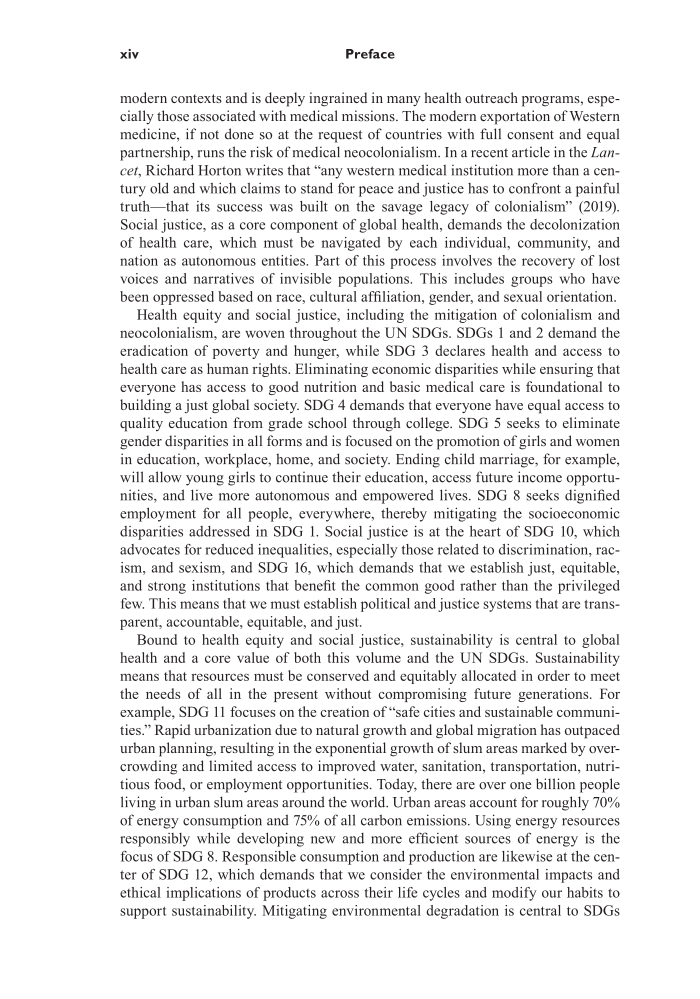xiv Preface modern contexts and is deeply ingrained in many health outreach programs, espe- cially those associated with medical missions. The modern exportation of Western medicine, if not done so at the request of countries with full consent and equal partnership, runs the risk of medical neocolonialism. In a recent article in the Lan- cet, Richard Horton writes that “any western medical institution more than a cen- tury old and which claims to stand for peace and justice has to confront a painful truth—that its success was built on the savage legacy of colonialism” (2019). Social justice, as a core component of global health, demands the decolonization of health care, which must be navigated by each individual, community, and nation as autonomous entities. Part of this process involves the recovery of lost voices and narratives of invisible populations. This includes groups who have been oppressed based on race, cultural affiliation, gender, and sexual orientation. Health equity and social justice, including the mitigation of colonialism and neocolonialism, are woven throughout the UN SDGs. SDGs 1 and 2 demand the eradication of poverty and hunger, while SDG 3 declares health and access to health care as human rights. Eliminating economic disparities while ensuring that everyone has access to good nutrition and basic medical care is foundational to building a just global society. SDG 4 demands that everyone have equal access to quality education from grade school through college. SDG 5 seeks to eliminate gender disparities in all forms and is focused on the promotion of girls and women in education, workplace, home, and society. Ending child marriage, for example, will allow young girls to continue their education, access future income opportu- nities, and live more autonomous and empowered lives. SDG 8 seeks dignified employment for all people, everywhere, thereby mitigating the socioeconomic disparities addressed in SDG 1. Social justice is at the heart of SDG 10, which advocates for reduced inequalities, especially those related to discrimination, rac- ism, and sexism, and SDG 16, which demands that we establish just, equitable, and strong institutions that benefit the common good rather than the privileged few. This means that we must establish political and justice systems that are trans- parent, accountable, equitable, and just. Bound to health equity and social justice, sustainability is central to global health and a core value of both this volume and the UN SDGs. Sustainability means that resources must be conserved and equitably allocated in order to meet the needs of all in the present without compromising future generations. For example, SDG 11 focuses on the creation of “safe cities and sustainable communi- ties.” Rapid urbanization due to natural growth and global migration has outpaced urban planning, resulting in the exponential growth of slum areas marked by over- crowding and limited access to improved water, sanitation, transportation, nutri- tious food, or employment opportunities. Today, there are over one billion people living in urban slum areas around the world. Urban areas account for roughly 70% of energy consumption and 75% of all carbon emissions. Using energy resources responsibly while developing new and more efficient sources of energy is the focus of SDG 8. Responsible consumption and production are likewise at the cen- ter of SDG 12, which demands that we consider the environmental impacts and ethical implications of products across their life cycles and modify our habits to support sustainability. Mitigating environmental degradation is central to SDGs
Document Details My Account Print multiple pages
Print
You have printed 0 times in the last 24 hours.
Your print count will reset on at .
You may print 0 more time(s) before then.
You may print a maximum of 0 pages at a time.















































































































































































































































































































































































































































































































































































































































































































































































































































































































































































































































































































